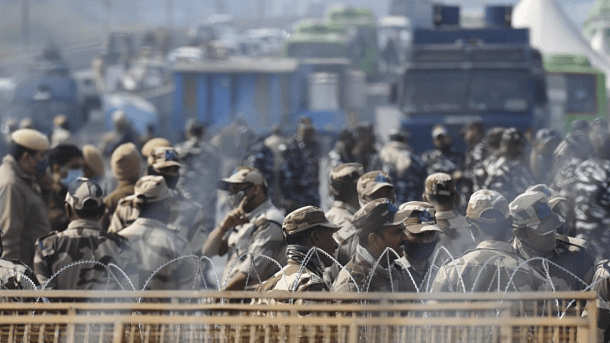Everyone’s talking about the tweet that shook the world. And while that was happening, slowly, surely, in spite of all the might of the Indian state, more farmers gathered to fight for their rights.
The reaction of the mighty state: teargas, water cannons, bull dozers, broken roads, nails, concertina wires, cement block barricades, arrests and more could not stop the tweet that shook the world nor the farmers.
In fact, the more the mighty state tries to stop everyone, the more those tweets shake the world. It is the mighty state’s extreme reaction which, rather than stopping the world in its evil tracks, that has alerted the world. And the countless helpers of the mighty state, scurrying about burning posters, accusing everyone who supports peaceful protests of being Muslim, Christian, Communist, activist, thinker, academic, journalist, extremists, terrorists, have also helped the word spread.
The world now knows that for the mighty Indian state, being a Christian is the same as being a terrorist. That India is not the democracy it wanted or claimed to be. That increasingly, voices are being stifled. That a world-famous climate activist teenager in Sweden, for tweeting a fairly common NGO document, gets a police case filed against her by the mighty Indian state.

The mighty Indian state sees in a few tweets a global conspiracy against the idea of India. After all, what did the mighty Indian state do wrong? It just passed three farm laws for the benefit of the farmers of India. So innocent, so fragile, so easily upset, the mighty Indian state.
And out of such gentle innocence, we have tear gas, water cannons, arrests and barricades.
The mighty Indian state has now allowed the world in. To relook at its various sedition cases against intellectuals, against social activists. To relook at its human rights abuses against Muslims, Dalits, women. To relook at its unconstitutional, discriminatory citizenship laws. To relook at its sustained campaigns against NGOs, artists, artistes, comedians, journalists, dissenters. To relook at its relentless assaults on the Constitution of India. To relook at the insurmountable damage done to its democratic institutions. To relook at how Hindu supremacist notions and majoritarian prejudices have resurfaced across Indian society.
Why did the mighty Indian state take on India’s farmers? Why did the mighty Indian state think that calling all Sikh farmers terrorists was a sustainable policy of governance? Why did the mighty Indian state not discuss its laws with farmers and their associations before bypassing its political opponents and pushing these contentious laws through?
An easy answer, possibly true, would be that the mighty Indian state was working for its capitalist friends – just one or two of them, not every Indian capitalist. But there is another answer. That the mighty Indian state was too full of its own importance, of hubris, of the heady feeling of overarching power, reach and control.
Nothing that the mighty Indian state has done in the past six years has produced this sort of a reaction. Every time, the mighty Indian state has been able to use its hammer fist to silence all opposition to a few inconsequential squeaks.
For the past six years, the mighty Indian state has had at its disposal a vast array of “influencers” – film stars, sports persons, columnists, industrialists – who have jumped at command and stood at attention. They have taken on dissenters, they have amplified and multiplied the mighty Indian state’s position and propaganda.
And yet, it was a tweet which shook the world and the mighty Indian state. The influencers made themselves global laughing stocks. Even within the suppressed population, there was restive mocking and laughter. And the numbers of farmers just grew. They came from areas not earlier involved.
They came from areas where the mighty Indian state had huge electoral success. They switched sides. They did not listen to bribery, cajoling, diktats. They planted flowers over the nails on the roads. They helped each other where the mighty Indian state had blockaded them.
They carried on demanding their rights. And the world has now heard them. That’s all that tweet did. It asked why no one was talking about India’s farmers. It just asked the question.
And the question shook the mighty Indian state. It took every wrong step it could. It reacted like a cornered animal rather than a mighty Indian state. It stumbled in front of an international music sensation like a broken toy. Not so mighty after all then.
































